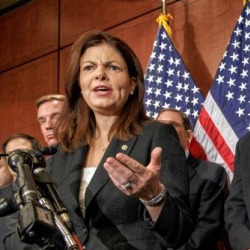
Graham, Feinstein, Ayotte (above), and Mike Lee Cosponsored the Bill in the US Senate
U.S. Senators Lindsey Graham, Kelly Ayotte, and Dianne Feinstein sent a letter to the US Justice Department asking them to support their bill which would impose a federal ban on online gambling. The letter suggests that online gambling makes gaming “pervasive” in the United States.
The Department of Justice has made no reply to the open letter. Given its stance on the UIGEA, the 1961 Wire Act, and online gambling since late-2011, there seems little indication the Justice Department will accede to the senator’s request. Graham, Ayotte, and Feinstein each signed the Restoration of the Wire Act bill which would see iGambling banned. Between the two Republicans (Graham, Ayotte) and one Democrat (Feinstein), they represent a bipartisan effort.
The 1961 Wire Act
THe 1961 Wire Act stipulated that the gambling over the phone lines was illegal in the United States. The act was used to prosecute organized crime for racketeering during Bobby Kennedy’s reign as U.S. Attorney General in the Sixties.
Much of the debate these days over the interpretation of the UIGEA law comes down to one’s interpretation of the Wire Act. In a key passage, the type of gambling discussed was “sports betting”, so interpretations come down to an expansive or limited version of the powers assumed by federal agencies.
The Safe Port Act
For three decades, the Wire Act was used to prosecute illegal sports betting rings. Since casino gambling and poker could not be transacted over the phone, such types of gaming were never prosecuted under the Wire Act. In the 1990’s, when the Internet made gambling possible on a computer, legal discussions centered around whether the U.S. government (or any government) had the right to police such activities.
In many western countries, governments decided to license, regulate, and tax online gambling. In the United States, the federal government did not involve itself in gaming, leaving enforcement to individual states. With the 9/11 Attack and the subsequent War on Terror, Internet wagering did not seem high on the list of priorities. The poles which were taken showed limited concern by the U.S. public to ban Internet gambling.
In September 2006, a controversy started over plans to have firms in Dubai administer American ports, for which these firms were contracted to do. The concern was whether foreign (Arab) companies would protect American ports from terrorist infiltration. The U.S. Congress quickly passed the “Safe Port Act”, which made it illegal for US cities to sub-contract such business with foreign firms.
Unlawful Internet Gambling Enforcement Act
The Poker Boom started in late-2003, after Chris Moneymaker won the 2003 World Series of Poker and the victory was televised heavily on ESPN. Americans suddenly became quite active in online gambling, and the industry made big money. Anti-gambling groups voiced concern about problem gambling and other social concerns, while some officials in federal agencies called for stricter enforcement.
In that time, U.S. Congressmen introduced the UIGEA bill. The proposed Unlawful Internet Gambling Enforcement Act had gotten little traction at the time. Members of the Republican-led Congress decided to tack the UIGEA onto the Safe Port Act. No red-blooded American would vote against safe ports in that era, so the UIGEA was passed with little trouble.
The Meaning of the UIGEA
The UIGEA gave federal agencies the right to enforce the 1961 Wire Act as it applied to online gambling. Horse racing, lottery betting, and fantasy sports were given exemptions, but other forms of gambling remained in a gray area. No doubt, the UIGEA made it illegal to engage in sports gambling. It could be debated either way that the UIGEA applied to online casinos and poker sites.
From 2006 to 2011, US federal agencies took the view that all forms of online gambling (not exempted) fell under the UIGEA. In late 2011, the states of New York and Illinois sent a formal question to the U.S. Justice Department, asking for a clarification. Taking a conservative approach to the original Wire Act, the Justice Department said the UIGEA applied to online sportsbooks, but not to Internet card rooms and casinos. The opinion suggested these actitivities had never been prosecuted before 2006, so to do so after 2006 was an unlawful expansion of federal authority.
Suddenly, it became legal for online casinos and poker rooms to accept US players, if they were licensed by a US state to do so. In 2012, the state of Delaware began licensing gaming companies to accept American gamblers. In 2013, New Jersey and Nevada followed suit.
Restoration of the Wire Act
Lindsey Graham and Jason Chaffetz decided to introduce the Restoration of the Wire Act to both houses of Congress, hoping to make it explicit that poker and casino gambling fell under the auspices of the Wire Act and UIGEA. Now they are asking the Justice Department to support their effort.
In the letter, the three senators wrote, “We must act before we find virtual casinos making gambling pervasive in our society, invading living rooms, bedrooms, and dorm rooms across the country; a result we know the DOJ does not want to see.”
This underestimates the sophistication of the technology used. The gaming tech used by New Jersey, Nevada, and Delaware makes it essential for a gambler to be inside a state’s borders for the technology to work. The system uses GPS tracking to assure people in the other 47 states cannot gamble. U.S. Justice Department officials understand this, so they are unlikely to sense the same urgency that Lindsey Graham, Kelly Ayotte, and Dianne Feinstein seem to sense.
